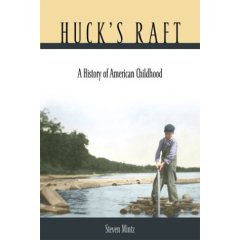 Huck's Raft: A History of American Childhood, by Steven Mintz was a book that took me a long time to read. Not because I didn't like it, or because it wasn't well written (I loved it, I learned a lot, and think it was very well-written), but because there was so much information in it. It was dense. Packed with things I thought were very interesting, and I kept turning back to the footnotes and marvelling and then thinking I should follow up on this other thing...it took me almost a week to read a chapter at that rate. And there were seventeen chapters, covering everything from the Puritans in "Children of the Covenant" to 2001 and "The Unfinished Century of the Child".
Huck's Raft: A History of American Childhood, by Steven Mintz was a book that took me a long time to read. Not because I didn't like it, or because it wasn't well written (I loved it, I learned a lot, and think it was very well-written), but because there was so much information in it. It was dense. Packed with things I thought were very interesting, and I kept turning back to the footnotes and marvelling and then thinking I should follow up on this other thing...it took me almost a week to read a chapter at that rate. And there were seventeen chapters, covering everything from the Puritans in "Children of the Covenant" to 2001 and "The Unfinished Century of the Child".Anyway, I'm finding Huck's Raft a bit hard to review, too, because I've already read a wonderful review of it here, written by Judith Stadtman Tucker. She said everything I would have said if I sat down and thought logically about the book and its relevance to our society and parenting today. Since Tucker already did that, though, that leaves me free to go and pick my favorite bits and pieces and highlight them. These are the passages that stuck in my mind, not necessarily the most important or exciting parts, mind you.
The chapter entitled "Growing Up in Bondage" on children in slavery in the American south was just heartbreaking to read....the infant mortality, malnutrition, broken families, and sexual abuse was overwhelming, and much worse than I think most Americans can imagine. Reading the personal stories (a device that Mintz uses in all of the chapters, jumping from the individual to the general) is amazing and awful.
"The Revolt of Modern Youth", on the early part of the 20th century, seems so very modern:
...Cornelia A.P. Comer, a Harvard professor's wife, published "A Letter to the Rising Generation" in the Atlantic Monthly. The younger generation, she grumbled, couldn't spell, and its English was "slipshod." Today's youth were selfish, discourteous, lazy, and self-indulgent. Lacking respect for their elders or for common decency, the young were hedonistic, "shallow, amusement-seeking creatures,"....The boys were feeble, flippant, and "soft" intellectually, spiritually, and physically. Even worse were the girls, who were brash, loud, and promiscuous with young men.
Guess what year that was written?
That was written in 1911. Before most of our parents were born. Those selfish, shallow, promiscuous, loud rebels were our great-grandparents.
Since I've written about Bronislaw Malinowski here, and took "imponderabilia" from him, I thought it was very entertaining when I read the following story, set in the 1920's:
Middle-class family life grew more democratic, affectionate, and child-centered, and the school and the peer group became more signficant in young people's lives. Bronislaw Malinowski told a story that underscored the shift. He and his five-year-old daughter argued, but despite his best efforts, the Polish-born anthropologist was unable to sway her opinion. The girl brought the argument "to an abrupt conclusion by announcing: 'Daddy, what an ass you are.'" Malinowski "tried to imagine what would have happened had I thus addressed my father some forty years ago. I shuddered and sighed."
Huck's Raft is worth reading even if you just read a few chapters (pick one - "Sons and Daughters of Liberty" on the American Revolution? "New to the Promised Land", on the children of immigrants? "In Pursuit of the Perfect Childhood", on the 1950's?) Whichever one you pick, whatever period of history you're interested in, you'll find some fascinating stuff in that chapter. And "Parental Panics and the Reshaping of Childhood" on the 80's and 90's - ah, I just wish this chapter was tacked onto the back of every newspaper or magazine article on parenting, as well as every parenting book out there, from Dr. Sears to the Pearls.
2 comments:
I think I might like to read this. I LOVE the excerpt about the awful youth of 1911! Too funny!
What a great article and good thoughts you have pulled together. I've not read the book but what you have read makes me realize you are really thinking....
Admire that. Nice post. Thanks.
Cheers. (newbie blogger)
Post a Comment